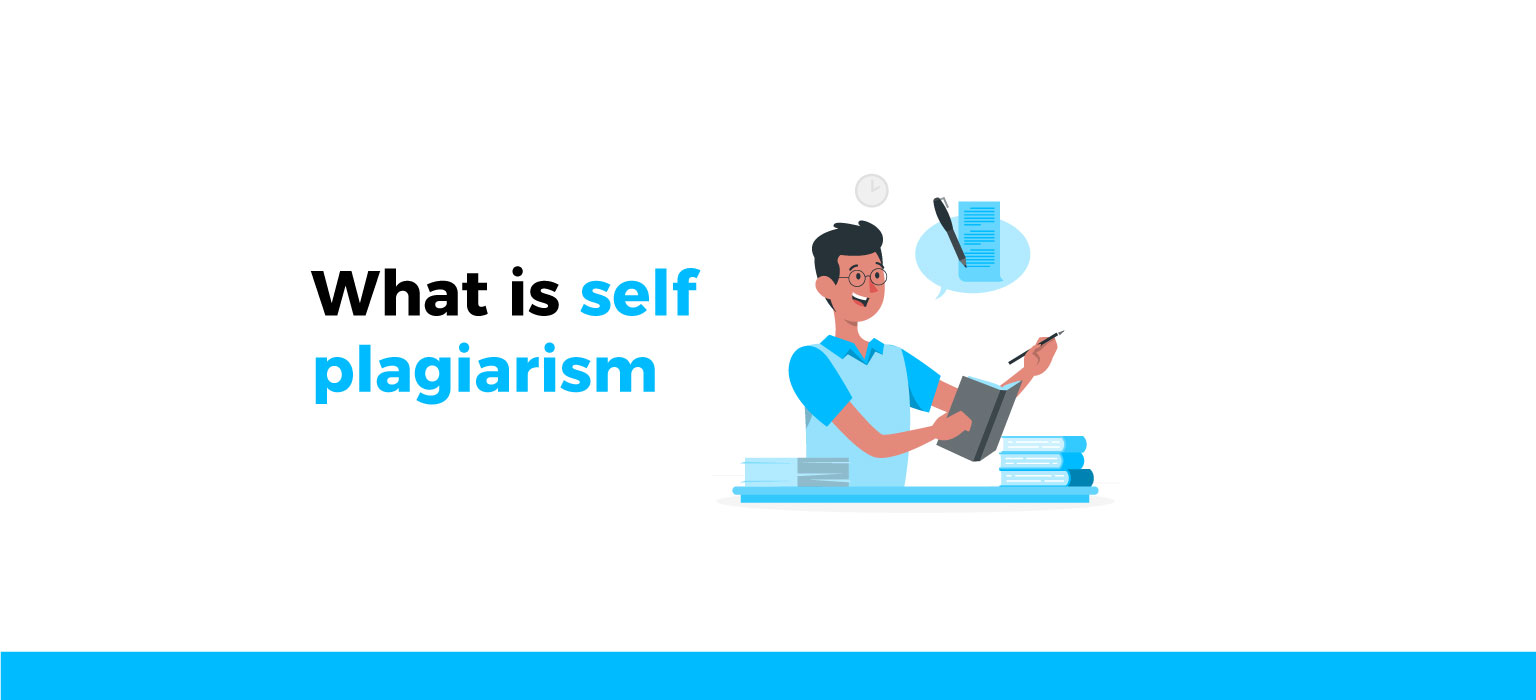Self-plagiarism is plagiarism, where students or writers plagiarize themselves through articles they have completed before.
This type of plagiarism can be understood as the form of reusing one of your creations and representing it elsewhere without proper attribution. You can not use your work without appropriate paraphrasing or citation.
Self-plagiarism includes:
- Complete re-presentation of your previous work
- Copying phrases from your last document
- Reworking some parts of a specific last search
- Publishing several articles on the same topic
Why do people self-plagiarize?
People are probably committing self-plagiarism, thinking that self-plagiarism is not morally wrong. On the other hand, some still do not fully understand the concept of self-plagiarism because they lack the ability to get information.
Self-plagiarism is academic dishonesty and lowers your reputation. Period.
Self-plagiarism results from a lack of initiative to do research from scratch, which results in using their previous material and presenting it as something new.
People are plagiarizing, perhaps without realizing it, but there are times when their early material may contain specific phrases that have been quoted.
And if you plagiarize yourself without citing yourself, you are committing copyright infringement by not citing yourself in the new creation.
Because of the opinion that they have exhausted the information on the same topic, they decide to use their earlier articles in which they have gathered information on almost the same topic.
So in this form, they are plagiarizing themselves and lowering their reputation; this will likely present problems in their academic career.
Why is self-plagiarism wrong?
Although self-plagiarism may not be taken as seriously as plagiarism of a person’s work or a specific source, you are still violating academic integrity, and the consequences may be similar to plagiarism.
If you commit plagiarism, you show no interest in creating new ideas. Meanwhile, you will be involved in the violation of the copyright, and because of this, you will lower your academic integrity.
The problem with self-plagiarism is that you are deceiving your readers with prior work by presenting it as new. You are not showing anything vital, but it seems you are trying to achieve another merit with something old.
How to avoid self-plagiarism?
Self-plagiarism is often challenging to understand, but you should always be careful not to repeat the things you have written before in new creations.
The easiest ways to avoid self-plagiarism are:
- Make searches from scratch
- Cite your previous work
- Recreate your ideas
- Take care of your writing
- Get copyright from their owner

Make searches from scratch
If your new topic is similar to one of the materials you have already published, start searching from the beginning.
You should do this for two reasons. Firstly, you can find new materials that you have not read before. And secondly, it allows you not to repeat your ideas from the previous ones.
Based on these, you are avoiding plagiarism and creating something new for the readers and your good.
Cite your previous work
You should cite yourself when you see fit to use phrases from your previous work in your new creation. In citations, you must include the name of the work, your name, the year of publication, and the publisher.
In this case, you avoid plagiarism because you are showing yourself, the work, and its publisher.
Recreate your ideas
Maybe it will seem troublesome when a new topic you are going to talk about is to do research from scratch.
But in this case, you can recreate ideas in collaboration with what you wrote earlier. Never take complete copies of your previous work that has been published.
Try to create something new for the reader through what you have searched before and what you will read. In this way, you avoid the accusation of self-plagiarism.
Take care of your writing
During a new piece of writing, you should plan how you will approach it. Make sure that even if you look at your previous work a bit, you recreate a new structure without boring the readers with the same topic.
Make separate notes on different topics and form a vital work for everyone. According to these steps, you will be one step away from plagiarism.
Get copyright from their owner
Even though you have created an earlier work, the publisher who published your work may own the copyright.
Before taking phrases from your earlier creations, get permission from the publisher of your work. Please make sure you explain in a good way how you will use your ideas and cite them in quotes.
Why is self-plagiarism a thing?
Self-plagiarism is academic dishonesty because you are not giving anything new of yourself, and you are deceiving the readers by doing so.
Furthermore, when you publish your article, you are giving the copyright to the person publishing it in this case. Copyright is protected by law and can cost you your career.
Self-plagiarism may sound unnatural, but there have been cases of such misconduct, and students have been expelled. A concrete example of the case is when a nursing student sued a college for being expelled due to self-plagiarism.
Is self-plagiarism acceptable?
Although self-plagiarism is not theft or fraud like plagiarism, it is still considered academic dishonesty.
It is not acceptable even though it is your work, though it may seem obvious, yes, you are not allowed to copy the work you have presented elsewhere. It is only permissible if you quote yourself in the quotes and phrases you take to rephrase them.
Are the consequences the same as plagiarism?
Although self-plagiarism is not considered theft or a violation of academic integrity, its consequences are almost the same as plagiarism.
- Your paper may be rejected in college if you have presented it in another class
- Your grade may be lowered or not assigned at all.
- Your article may be rejected for publication if it contains similarities to your previous article
- You also violate copyrights, for which you can be punished.
Plagiarism vs self-plagiarism
We often face people who do not know about plagiarism as a concept and its consequences. If someone doesn’t understand plagiarism, then they don’t know about self-plagiarism as its branch.
Plagiarism and self-plagiarism are problems in themselves. We must first understand the concepts of both and thus act by staying away from both.
Plagiarism is intellectual theft and a violation of academic integrity because someone else’s work is being appropriated.
While self-plagiarism is a type of plagiarism, in this case, the individual is plagiarizing themselves, and this causes academic dishonesty.
In this explanation that we just made, we noticed the first difference between these two. So, self-plagiarism means academic dishonesty, while plagiarism is intellectual theft and a violation of academic integrity.
During plagiarism, you are appropriating someone else’s work and presenting it as your own. Whereas in self-plagiarism, you represent your work as if it were fresh.
With plagiarism, you violate copyright, while self-plagiarism causes dishonesty but rarely copyright infringement.

The consequences of self-plagiarism
If you are a student, you should see the university’s policies on self-plagiarism.
Before each new paper is similar to your previous writing, you should consult with your two professors and ask if they agree to use parts of the materials from your last article.
But what is best is to recreate your words and ideas and present new things in your latest work.
If, as an academic researcher, you have committed self-plagiarism in your paper, then journals may reject your publication.
In addition, you can be accused of violating academic integrity and risk your future career. First, ensure that you have protected copyright, respected academic integrity, and bring something fresh even if you have to cite yourself.
Conclusion
So, self-plagiarism is known as academic dishonesty, where you resubmit your previous work. You should know that this behavior is not only academic dishonesty but also low behavior, which affects academic integrity.
The consequences of self-plagiarism are almost the same as those of plagiarism; thus, you risk your career. You must be careful while creating your articles to avoid plagiarism.
Self-plagiarism can be easily avoided by researching and creating original ideas. You must also protect the copyright and obtain permission from the publisher who published your work if you need to use any of it.
Although it is not illegal, it is improper and can cause problems in building your career. Always try to present new ideas and avoid self-plagiarism.

Agnesa is crazy about math and has won lots of prizes. Although her main gig is being a full-stack developer, she also likes to write about topics she knows really well.
But, Agnesa isn’t just about numbers and algorithms.
When she’s not crunching code or weaving words, you’ll find her conquering mountains with her trusty hiking boots!

